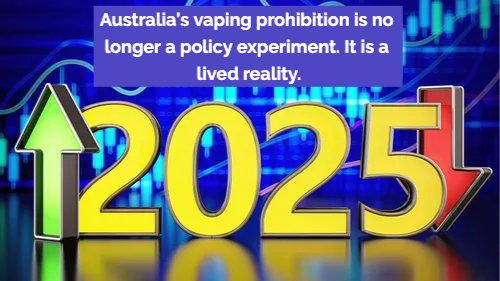Supermarket Cigarette Ban: Another Step in the War on Visibility, Not Behaviour
- Alan Gor

- May 31, 2025
- 4 min read

Alan Gor 31 May 2025
The Lung Foundation Australia is back in the media spotlight, calling for cigarettes to be banned from sale in major supermarkets. Their reason? “Accessibility.” Their logic? If tobacco is out of sight, fewer people will smoke. Their real target? People who use nicotine.
Let’s be clear: this isn’t about health. It’s about control.
Just like with vaping, the approach is the same: remove legal access, offer no viable alternatives, blame the individual, and let the black market fill the gap. It’s not about helping people quit. It’s about trying to erase people who use nicotine.
1. “Out of Sight” Doesn’t Mean “Out of Use”
Sarah Waters, quoted by the ABC, began smoking at 11. By 13, she was addicted. “When I started smoking, there was no information about the dangers,” she said. “It was actually advertised in teenage magazines … all the movie stars, models had them. It was cool, it was prestigious.”
Her experience is tragic and heartbreakingly common. But let’s not pretend removing cigarettes from supermarket shelves would have helped her. It wouldn’t have.
Sarah herself admits, “If you are at the shops and they are there, you can just say, ‘It will be my last packet.’ If it is not there, then I think it would be the extra barrier to help someone quit.”
But that barrier is wishful thinking for many. Barriers don’t help everyone quit. In fact, for many people, especially those with limited transport, income, or support, barriers just push them further into desperation and more dangerous territory.
Just ask the millions of Australians who now turn to unregulated dealers for vaping products. Why? Because the government made the regulated option inaccessible. This exact scenario is already playing out with nicotine. And they want to repeat it with tobacco.
2. Mark Butler: Repeating History, Ignoring Consequences
Health Minister Mark Butler used this media cycle to congratulate his government on “reigniting the fight” against tobacco. He referenced laws passed in 2023 that introduced more graphic health warnings and mandated inserts in cigarette packaging.
But while the Health Minister congratulates himself, here’s what’s happening on the ground:
$20.8 million worth of illegal cigarettes and vapes were seized in Queensland in just one month.
Firebombings and extortion rackets are increasing as organised crime moves in.
People trying to quit smoking through vaping are being criminalised.
Safer alternatives remain banned, restricted, or impossible to access legally.
And yet, that’s exactly what Butler’s policy has become: a war on people who use nicotine. This isn’t prevention. It’s punishment.
3. “Cutting Access” Creates Demand Elsewhere
Lung Foundation CEO Mark Brooke said:
“By removing as many of those points of sale or limiting those points of sale, [we] limit accessibility … it’s an important part of the solution.”
But limiting accessibility to legal products doesn’t remove demand, it just moves it somewhere else.
What’s missing from this conversation is everything that matters:
Harm reduction
Support for switching
Safer nicotine alternatives
Compassionate policy
Why is it that when it comes to alcohol, we talk about responsible use, addiction support, and recovery, but with nicotine, we talk about bans, restrictions, and raids?
4. The Double Standard: What If This Were About Alcohol?
Imagine this: someone in recovery from alcohol dependence is at a footy game. People around them are drinking beer. Advertisements are everywhere. Later, they walk past a BWS, a Dan Murphy’s, and a pub on every corner.
Do we ban bottle shops? Remove alcohol from supermarkets? Treat them like public threats?
Of course not.
We understand that people in recovery need support, not surveillance. We offer services, treatment options, peer support, and community education. We don’t launch a prohibition campaign every time someone relapses.
So why does nicotine get treated differently?
Because public health in Australia has become moralistic and punitive when it comes to nicotine. There is no tolerance, no nuance, no understanding. Just control.
5. This Is an Ideological War, Not Public Health
The Lung Foundation, the Health Department, and many aligned groups have moved far beyond reducing smoking. They want to eliminate all nicotine use, even if it’s safe, legal, and effective.
Their war is not on tobacco harm. It’s on nicotine itself.
And who pays the price?
The long-term smoker who finally found relief through vaping.
The single mum who needs to buy a packet without travelling across town.
The pensioner who doesn’t want to risk buying black-market tobacco.
The person who can’t quit — not because they don’t want to, but because nothing has worked yet.
Final Word: It’s Time for Grown-Up Policy
Removing cigarettes from supermarkets might feel like an action. But it’s not health. It’s theatre. And it’s dangerous.
We’ve seen this play out before:
Visibility bans for vape products didn’t reduce use; they just moved it out of view and into the black market.
Prescription-only vape laws didn’t support quitting; they fuelled crime and confusion.
And now, tobacco restrictions without harm reduction options will do the same.
If we really want to reduce smoking:
✅ Make safer alternatives accessible
✅ Provide real support to quit
✅ Treat people who use nicotine with dignity
✅ Centre harm reduction in every policy
Because this isn’t about tobacco. It’s about people.
Bans create black markets. Options create change.


